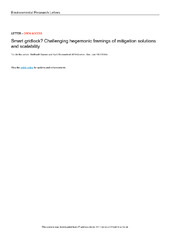Smart gridlock? Challenging hegemonic framings of mitigation solutions and scalability
Peer reviewed, Journal article
Published version

Åpne
Permanent lenke
https://hdl.handle.net/1956/21689Utgivelsesdato
2019-07-05Metadata
Vis full innførselSamlinger
- Department of Geography [627]
Originalversjon
https://doi.org/10.1088/1748-9326/ab21e6Sammendrag
Urban energy transitions are key components of urgently requisite climate change mitigation. Promissory discourse accords smart grids pride of place within them. We employ a living lab to study smart grids as a solution geared towards upscaling and systematisation, investigate their limits as a climate change mitigation solution, and assess them rigorously as urban energy transitions. Our 18 month living lab simulates a household energy management platform in Bergen. Norway's mitigation focus promotes smart meter roll-out as reducing carbon emissions, by (i) unlocking efficiency gains, and (ii) increasing awareness for demand-side management. We problematise this discourse. Raising awareness encounters intractable challenges for smart grid scalability. Scattered efficiency gains constitute modest increments rather than the substantial change requisite for rapid mitigation. Whereas promissory smart grid discourse overlooks these ground-truthed limits, our findings caution against misplaced expectations concerning mitigation. We contest discursive enthusiasm on smart grids and argue for aligning local and systemic concerns before upscaling to avoid obscuring risks. Scaling up requires understanding and addressing interdependencies and trade-offs across scales. Focus group discussions and surveys with living lab participants who used sub-meter monitors to track real-time household electricity consumption data over an extended period show that technical issues and energy behaviour, as well as political economic and policy structures and factors, pose significant limits to smart grids. Urban strategies for climate change mitigation must be informed by this recognition. Our results indicate that upscaling relies on bottom-up popular acceptance of the salient technical, organisational and standardisation measures, but that measures to improve the democratic legitimacy of and participation in energy transitions remain weak. We highlight limits to smart grids as a standalone urban mitigation solution and call for a sharper focus on accompanying thrust areas for systematisation and scalability, such as renewable energy integration and grid coordination.
